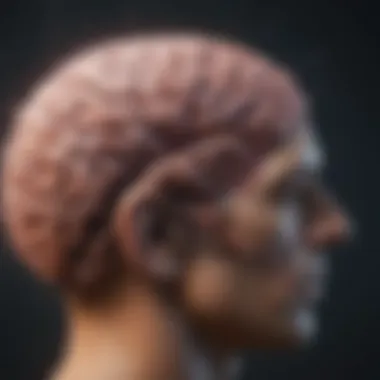Mastering Persistent Anxiety: Strategies for Effective Management


Understanding and Cultivating Mindfulness
Mindfulness is the practice of being fully present and aware of one's thoughts, feelings, and surroundings. This mental state offers a myriad of benefits, including reduced stress, improved focus, and enhanced emotional regulation. Incorporating mindfulness into daily life can lead to heightened self-awareness and overall well-being. By engaging in mindfulness practices, individuals can develop a deeper understanding of their inner workings and increase their ability to respond thoughtfully rather than react impulsively to situations. Techniques such as mindful breathing, body scans, and mindful walking can aid in cultivating mindfulness on a regular basis.
Exploring Guided Meditation Practices
Guided meditation sessions provide structured guidance for individuals looking to deepen their meditation practice. These sessions can vary in length, focus, and style, catering to a wide range of preferences and needs. Beginning a guided meditation practice involves finding a quiet, comfortable space and selecting a meditation that aligns with one's intentions, whether it be for relaxation, focus, or emotional healing. Tips for enhancing the meditation experience include setting a regular schedule, using headphones for immersive sound quality, and practicing gratitude and self-compassion throughout the session.
Strategies for Managing Stress and Anxiety
Stress and anxiety can stem from various sources, including work pressures, personal relationships, and societal expectations. Mindfulness techniques offer valuable tools for reducing stress and anxiety by promoting present-moment awareness and acceptance of difficult emotions. Incorporating breath-focused exercises, body scans, and loving-kindness meditations into daily routines can help individuals navigate overwhelming feelings with greater ease. Additionally, coping strategies such as journaling, progressive muscle relaxation, and talking to a mental health professional can provide further support in managing stress and anxiety effectively.
Optimizing Sleep Quality and Routine
Quality sleep is essential for optimal physical and mental health, playing a vital role in cognitive function, emotional regulation, and overall well-being. Guided meditations specifically designed for sleep can aid in relaxation and promote restful slumber. Establishing a calming bedtime routine, including activities such as reading, gentle stretching, or listening to soothing music, can signal to the body that it is time to unwind and prepare for sleep. Creating a dark, quiet, and comfortable sleep environment is also crucial for fostering quality rest.
Fostering Mindfulness in Professional Settings
Enhancing mindfulness in the workplace can lead to improved focus, creativity, and productivity. Taking moments throughout the workday to engage in brief mindfulness practices, such as mindful breathing or short meditative breaks, can help individuals stay centered and composed amidst professional demands. Techniques for managing work-related stress include setting boundaries, practicing assertive communication, and prioritizing tasks based on importance and urgency. By integrating mindfulness into daily work practices, individuals can cultivate a greater sense of presence and resilience in a fast-paced professional environment.
Anxiety is a complex mental health condition that affects millions of individuals worldwide. In this comprehensive guide, we delve into the core factors contributing to persistent anxiety and provide effective strategies to manage and alleviate its symptoms. By exploring the root causes of anxiety, we aim to offer a holistic understanding that can empower individuals to take control of their mental well-being.
Exploring the Root Causes of Persistent Anxiety
Understanding the underlying triggers of persistent anxiety is crucial in developing targeted interventions. By dissecting the biological, psychological, and environmental aspects influencing anxiety, we can unravel the complexity of this condition. This section sheds light on the intricate connection between these root causes and how they manifest in individuals experiencing persistent anxiety.
Biological Factors


Biological factors play a significant role in shaping an individual's predisposition to anxiety disorders. Genetic predispositions and neurochemical imbalances are key components that can influence one's susceptibility to anxiety. Genetic predispositions refer to inherited traits that may increase the likelihood of developing anxiety disorders. On the other hand, neurochemical imbalances involve dysregulations in brain chemistry, such as imbalances in neurotransmitters like serotonin and dopamine. Understanding these biological underpinnings is essential in pinpointing effective treatment strategies that target the root biological causes of anxiety.
Psychological Triggers
Psychological triggers encompass past trauma and negative thought patterns that can fuel persistent feelings of anxiety. Past trauma refers to distressing events or experiences that have left a lasting impact on an individual's mental well-being. Negative thought patterns involve habitual cognitive processes that lean towards pessimism and self-criticism. These psychological triggers contribute to the maintenance of anxiety symptoms and can hinder the individual's ability to cope effectively with stressful situations. By addressing these psychological triggers, individuals can begin to unravel the underlying sources of their anxiety and work towards emotional healing and resilience.
Environmental Influences
Environmental factors such as stressful life events and social pressures can exacerbate feelings of anxiety. Stressful life events encompass significant challenges or upheavals that disrupt an individual's sense of stability and security. Social pressures refer to the expectations and judgments imposed by social circles or societal norms, which can create internal conflict and emotional distress. By recognizing the impact of these environmental influences, individuals can cultivate strategies to mitigate their negative effects and create a more conducive environment for managing anxiety.
Impact of Persistent Anxiety on Mental Health
In this article, delving into the Impact of Persistent Anxiety on Mental Health is essential for a comprehensive understanding of how anxiety affects mental well-being. By exploring cognitive impairment and emotional distress caused by persistent anxiety, we shed light on crucial aspects of mental health. These include difficulties in concentration and memory retention, as well as heightened irritability and feelings of hopelessness. Recognizing these impacts is pivotal in developing effective strategies for managing anxiety and promoting mental wellness.
Cognitive Impairment
Difficulty Concentrating
Discussing Difficulty Concentrating within the context of persistent anxiety is vital for understanding the cognitive challenges individuals face. Difficulty Concentrating significantly hampers one's ability to focus, impacting daily functioning and quality of life. It is a prevalent issue in anxiety-related cognitive impairments and plays a central role in affecting productivity and overall cognitive performance. The unique feature of Difficulty Concentrating lies in its disruptive nature, making it a top priority to address when managing persistent anxiety. While it can impede progress, recognizing and targeting this challenge is crucial for effective coping mechanisms.
Memory Issues
Memory Issues are another critical aspect of cognitive impairment linked to persistent anxiety. The struggle to retain and recall information can heighten stress and contribute to feelings of inadequacy. Memory retrieval difficulties can impact various areas of life, from work responsibilities to personal relationships, amplifying anxiety symptoms. Understanding the key characteristics of Memory Issues, such as forgetfulness and confusion, underscores the complexity of managing anxiety's cognitive effects. Unraveling the unique features of Memory Issues enables tailored interventions to enhance memory function and mitigate the challenges posed by persistent anxiety.
Emotional Distress
Increased Irritability


Examining Increased Irritability in the context of persistent anxiety illuminates the emotional turmoil individuals experience. Heightened irritability can strain relationships and hinder effective communication, leading to increased stress levels. It is a prevalent manifestation of anxiety-related emotional distress and requires careful consideration in treatment approaches. The unique feature of Increased Irritability is its immediate impact on interpersonal dynamics, necessitating prompt intervention to alleviate emotional distress and enhance emotional regulation.
Feelings of Hopelessness
Feelings of Hopelessness represent a deep emotional struggle often observed in individuals grappling with persistent anxiety. The overwhelming sense of despair and pessimism can profoundly impact one's outlook on life and future prospects, intensifying anxiety symptoms. Recognizing the key characteristic of Feelings of Hopelessness – a pervasive sense of futility – is crucial in developing interventions to instill hope and motivation. Navigating the unique feature of Feelings of Hopelessness demands a comprehensive approach that addresses the root causes of despair and fosters resilience in the face of persistent anxiety.
Effective Coping Mechanisms for Managing Anxiety
In this segment of the comprehensive guide on Understanding and Managing Persistent Anxiety, we delve into the pivotal aspect of Effective Coping Mechanisms for Managing Anxiety. Recognizing the importance of this topic lies in its role in providing individuals with practical tools to navigate and alleviate their anxiety symptoms effectively. By focusing on specific elements such as mindfulness practices, cognitive-behavioral techniques, and lifestyle modifications, this guide equips readers with a well-rounded approach to managing anxiety. Understanding the benefits of having such coping mechanisms can significantly aid individuals in enhancing their mental well-being and resilience. It is crucial to consider individual preferences, capabilities, and the context in which these coping strategies are implemented to ensure their effectiveness.
Mindfulness Practices
Deep Breathing Exercises
Deep Breathing Exercises play a fundamental role in the realm of mindfulness practices when managing anxiety. The essence of deep breathing lies in its ability to regulate one's breath, slowing down the pace and inducing a sense of calmness. This exercise is particularly beneficial for reducing physiological symptoms of anxiety, such as rapid heartbeat and shallow breathing. Deep Breathing Exercises are a popular choice in this guide due to their simplicity, accessibility, and immediate impact on anxiety levels. The unique feature of this practice is its effectiveness in promoting relaxation by activating the body's parasympathetic nervous system, counteracting the 'fight-or-flight' response commonly experienced in anxiety-provoking situations. While deep breathing is generally well-tolerated, some individuals may find it challenging to focus on their breath initially, requiring practice to master this technique effectively.
Body Scan Meditation
Another integral component of mindfulness practices for managing anxiety is Body Scan Meditation. This technique involves systematically directing attention to different parts of the body, observing any sensations without judgment. Body Scan Meditation contributes to the overarching goal of promoting self-awareness and detachment from distressing thoughts or feelings. The key characteristic of Body Scan Meditation is its emphasis on cultivating present-moment awareness, enhancing one's ability to observe physical sensations without reacting impulsively. This practice is favored in the guide for its holistic approach to addressing anxiety, integrating the mind-body connection in promoting relaxation. The unique feature of Body Scan Meditation lies in its adaptability to different settings, making it a versatile tool for individuals seeking to alleviate anxiety symptoms. However, some individuals may find it challenging to maintain focus throughout the entire body scan, requiring persistence and practice to fully reap its benefits.
Cognitive-Behavioral Techniques
Thought Restructuring
Thought Restructuring stands out as a cornerstone of cognitive-behavioral techniques for managing anxiety. This approach involves identifying and challenging negative thought patterns that contribute to heightened anxiety levels. Thought Restructuring aims to reframe irrational beliefs or catastrophic interpretations, fostering a more balanced and realistic perspective. The key characteristic of this technique is its emphasis on cognitive restructuring, targeting the underlying cognitions that drive emotional distress. Thought Restructuring is a beneficial choice for this guide due to its evidence-based nature and long-term effectiveness in changing maladaptive thinking habits. The unique feature of Thought Restructuring lies in its empowerment of individuals to actively engage in self-monitoring and cognitive reframing, enhancing their emotional regulation skills. While Thought Restructuring can be demanding initially, requiring self-reflection and introspection, its gradual implementation can lead to significant improvements in managing anxiety.
Exposure Therapy


Exposure Therapy emerges as a valuable component of cognitive-behavioral techniques for anxiety management, particularly in addressing specific phobias or anxieties. This approach involves gradual exposure to feared stimuli or situations, allowing individuals to confront their fears in a controlled and supportive environment. Exposure Therapy highlights the process of habituation, where repeated exposure decreases the intensity of anxiety responses over time. The key characteristic of Exposure Therapy is its systematic desensitization to anxiety triggers, promoting adaptive coping mechanisms and reducing avoidance behaviors. In this guide, Exposure Therapy is recommended for individuals seeking to confront and overcome their anxiety triggers effectively. The unique feature of this technique lies in its individualized and tailored approach to addressing specific fears, enhancing motivation and resilience in facing anxiety-provoking situations. While Exposure Therapy can be emotionally challenging, particularly in the initial phases of exposure, its gradual progression and support from a therapist can cultivate lasting changes in anxiety management.
Lifestyle Modifications
Physical Activity
Integrating physical activity into daily routines serves as a cornerstone of lifestyle modifications for managing anxiety. Physical activity encompasses a range of exercises, from aerobic activities to strength training, that promote overall well-being and mental health. The key characteristic of physical activity is its role in releasing endorphins, neurotransmitters that create a positive mood and reduce stress. Physical activity is a beneficial choice for this guide due to its multifaceted benefits in improving physical health, cognitive function, and mood regulation. The unique feature of physical activity lies in its adaptability to individual preferences and abilities, allowing for a personalized approach to incorporating exercise as a coping mechanism for anxiety. While physical activity offers numerous advantages, individuals should consider their health status and consult healthcare providers before initiating any new exercise regimen to ensure safety and effectiveness.
Healthy Sleep Habits
Prioritizing healthy sleep habits is paramount in the realm of lifestyle modifications for managing anxiety. Adequate sleep hygiene practices, such as maintaining a consistent sleep schedule and creating a restful sleep environment, play a crucial role in regulating emotions and reducing stress levels. The key characteristic of healthy sleep habits is their impact on overall brain function and emotional regulation, essential components in managing anxiety symptoms. Healthy sleep habits are a beneficial choice for this guide owing to their essential role in promoting recovery and resilience in the face of daily stressors. The unique feature of healthy sleep habits lies in their ability to enhance cognitive processes, memory consolidation, and emotional processing, fostering a more adaptive response to anxiety-provoking situations. While cultivating healthy sleep habits may require adjustments in lifestyle and bedtime routines, the long-term benefits in enhancing mental well-being make it a worthwhile investment for individuals seeking to manage anxiety effectively.
Seeking Professional Help and Support
In this pivotal section of the comprehensive guide on Understanding Persistent Anxiety, the focus shifts towards the crucial aspect of Seeking Professional Help and Support. Delving into the importance of seeking assistance from trained professionals in managing anxiety is essential. Expert guidance can offer tailored interventions and treatment modalities that cater to individual needs to effectively address anxiety concerns. The benefits of Seeking Professional Help and Support encompass access to specialized knowledge, personalized therapeutic strategies, and a supportive environment conducive to healing from anxiety-related challenges.
Therapeutic Interventions
Counseling
Discussing Counseling in the context of anxiety management elucidates its pivotal role in providing psychotherapeutic support. Counseling offers a safe space for individuals to explore and address underlying concerns contributing to their anxiety. A key characteristic of Counseling is its emphasis on fostering a collaborative therapeutic relationship between the counselor and the individual seeking help, promoting trust and openness in the therapeutic process. Counseling stands out as a beneficial choice due to its focus on enhancing coping skills, improving self-awareness, and promoting emotional well-being. The unique feature of Counseling lies in its ability to provide practical solutions and coping strategies tailored to the individual's specific anxiety triggers, thereby empowering them to navigate anxiety more effectively.
Psychotherapy
Examining Psychotherapy within the context of anxiety management highlights its significance in addressing complex emotional issues contributing to anxiety symptoms. Psychotherapy delves deeper into exploring underlying psychological factors influencing anxiety, aiming to bring about lasting behavioral and emotional changes. A key characteristic of Psychotherapy is its comprehensive approach, incorporating various therapeutic techniques to address diverse aspects of anxiety and mental well-being. Psychotherapy is a popular choice for anxiety management due to its effectiveness in promoting long-term recovery and emotional resilience. The unique feature of Psychotherapy lies in its capacity to uncover deep-seated emotional patterns and beliefs that drive anxiety, fostering profound insights and sustainable healing.
Medication Options
Antidepressants
Analyzing the role of Antidepressants in anxiety treatment underscores their efficacy in addressing underlying depressive symptoms often co-existing with anxiety disorders. Antidepressants play a key role in regulating neurotransmitters in the brain, alleviating depressed mood, and restoring emotional equilibrium. A key characteristic of Antidepressants is their ability to provide relief from both anxiety and depression symptoms concurrently, offering a comprehensive approach to mental health management. Antidepressants are a popular choice in anxiety treatment due to their proven effectiveness in improving mood, reducing anxiety levels, and enhancing overall quality of life. The unique feature of Antidepressants lies in their capacity to stabilize mood, alleviate persistent feelings of sadness, and promote emotional stability, thereby fostering a sense of well-being.
Anxiolytics
Exploring the realm of Anxiolytics in anxiety management sheds light on their role in providing symptomatic relief from acute anxiety episodes. Anxiolytics act quickly to reduce anxiety symptoms by enhancing the inhibitory neurotransmitter GABA in the brain, promoting a calming effect and reducing excessive neuronal excitability. A key characteristic of Anxiolytics is their rapid onset of action, making them a preferred choice for managing acute anxiety crises effectively. Anxiolytics are beneficial in anxiety management for their ability to alleviate panic attacks, reduce physiological symptoms of anxiety, and induce relaxation. The unique feature of Anxiolytics lies in their capacity to provide immediate relief from overwhelming anxiety symptoms, restoring a sense of calm and equilibrium to individuals experiencing acute distress.







